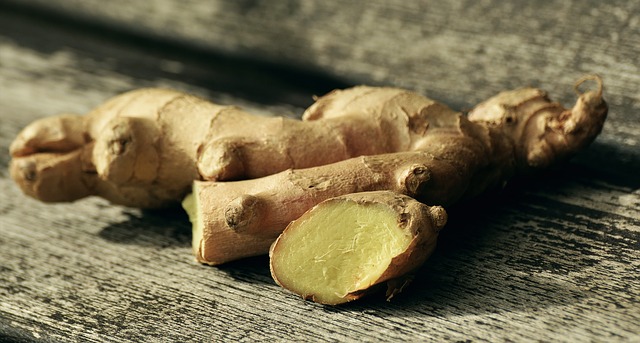11 Health Benefits of Ginger, According to Science
Ginger, being one of the healthiest spices in the world, is also the most endorsed dietary condiment. You’re probably guessing its plant family, so let me tell you that it’s a part of the turmeric and cardamom plant family. There are many ways to cook ginger into your daily diet such as in powdered form, dried, pureed, or minced. So consuming sufficient amounts of ginger into your diet shouldn’t be a problem for most of you. Apart from the basic health benefits such as fighting inflammation and reducing pain, ginger is great for the skin, heart, and liver. It has a positive effect on your respiratory system as much as it’s helpful for muscle and bone health. Another one of its most common health benefits is for optimal digestive health. That’s why you’ll hear or see people drinking more ginger tea for battling gastrointestinal problems. It’s true when they say that ginger is a magical condiment with many healing properties.
1. Ginger Root is Good for Reducing Muscle Pain and Soreness
Feeling a bit sore after your workout? Or did you get injured?
Eating ginger daily can help reduce muscle pain by at least 25%, according to a study. The kind of muscle pain one experiences due to excessive exercise can last for a very long time. It can lead to pain, soreness, and even joint stiffness.
The study focused on volunteers with exercise-induced muscle pain, and the results showed that ginger-treated participants experienced reduced muscle pain and increased physical function. (1)
Exercise-induced pain ofttimes leads to injuries that just increases more discomfort and pain. That’s why keeping your muscles in proper shape can help alleviate certain muscle injuries and stiffness.
The anti-inflammatory effects of ginger work at a cellular level to lessen pain. It also overcomes muscle tension of the body with the help of ginger extracts. Aching muscles and joints are a common phenomenon with fitness enthusiasts. By affecting the muscle pain pathways in the human body, gingers works hard to reduce aching muscles and joints in most healthy individuals.
Key Takeaway: Ginger is a powerful anti-pain condiment. It relieves muscle pain and soreness, caused by exercising or an injury. Researchers have developed a strong case for ginger’s anti-inflammatory properties to help with muscle pain relief.
2. Consuming Ginger May Prevent Severe Asthma Symptoms
The sweet and tangy flavor of ginger has powerful asthma-preventing properties.
Asthma is a respiratory condition where excessive inflammation in the body affects your body’s airways. The airways or bronchial tubes become too narrow and swollen to allow normal breathing functionings, hence people with asthma suffer from shortness of breath, coughing, and wheezing. (2)
Asthma can be a more or less a dangerous respiratory dysfunction that interferes with the person’s daily lifestyle. It also has a drastic impact on a person’s fitness routine due to lack of oxygen intake.
Ginger comes with a very long and scientifically-backed history of treating asthma problems. A study suggests that the purified components present in ginger work well with isoproterenol to fight asthma symptoms. This helps the bronchial tubes relax and cause less inflammation in the body.
Traditionally, coupled with effective asthma prevention supplements, ginger plays a very important role in reducing inflammation and providing relief from asthma symptoms. Many people use ginger as a part of their daily diet to prevent the development of such bronchoconstrictive diseases. (3)
Key Takeaway: Ginger clears the body’s airways or bronchial tubes for proper breathing function. The highly active compounds present in ginger work with certain supplements such as isoproterenol and agonists.
3. Ginger Helps with Nausea and Vomiting Caused by Pregnancy and Chemotherapy
Nausea is a symptom of many changes that occur inside the body. This includes diseases, pregnancy, medical procedures such as chemotherapy, and bacterial infections. Ginger has been used, for centuries, as a natural digestive condiment for relieving nausea and vomiting sensations.
Multiple studies focused on the positive effects of ginger on chemotherapy-induced nausea and vomiting. Studies confirm that sufficient doses of ginger extract can reduce the intensity of nausea. If taken before receiving chemotherapy, it can have a positive effect on recovery. (4)
Another research conducted to prove the effects of ginger on pregnancy-induced nausea and vomiting confirms that the anti-inflammatory properties of ginger significantly relieved nausea in pregnant women. The study was conducted on 70 pregnant women for 4 consecutive days. (5)
Lastly, to study the effects of ginger on disease or infection-induced nausea and vomiting also came out with positive results. Ginger’s powerful compounds offer gastrointestinal relief as opposed to other medical supplements such as metoclopramide. (6)
Key Takeaway: Ginger contains powerful anti-inflammatory compounds such as gingerols. They help relieve the sensation of nausea and vomiting due to chemotherapy, pregnancy, and any other disease.
4. Ginger Offers Positive Effects for The Treatment of Giardiasis
Giardia infection or giardiasis is a chronic intestinal infection that is characterized by diarrhea, bloating, nausea, and abdominal cramps. It is one of the most common intestinal infections in children. In left untreated, it can lead to life-threatening health risks.
There are only environmental factors that cause giardiasis, such as unclean drinking water, poor sanitation, and food parasites present in unhealthy or unclean food. One of the things you don’t know about this life-threatening infection is that it is transferable through person-to-person contact as well as through food. (7)
While there are several medical supplements that you must have to treat giardiasis, prevention is also possible for such bacterial infections in the digestive system.
For example, the dichloromethane extracts present in ginger reduce overall infection count in the bodies of albino rats. The tests were divided into 6 groups with 5 infection-induced rats each.
The antibacterial capacity defeats the effects of other drugs for the treatment of such gastrointestinal infections. (8)
Key Takeaway: Ginger is a therapeutic antigiardial drug for the treatment and prevention of the life-threatening symptoms of giardia infection. The compounds present in ginger have antibacterial, antiviral, and antidiarrheal properties to improve the health of the digestive system.
5. Ginger Drastically Lowers Free Radical Damage Linked With Inflammatory Diseases
Ginger contains highly effective flavonoids and anti-inflammatory compounds to reduce the severe effects of free radical damage in the human body.
It contains rich phytochemicals and non-volatile compounds such as gingerols, shogaols, paradols, and zingerone. All these potential compounds play a role in reducing oxidative stress caused by free radicals.
A number of diseases are linked with free radical-induced inflammation in the body. Such as cancer, cardiovascular disease, arthritis, digestive diseases, etc. So there’s urgent need of a powerful antioxidant to balance the oxidant capacity in the human body.
Free radical production is essential for energy production in the body, but an excess of scavenge free radicals leads to oxidative stress. Ginger increases the capacity of antioxidant enzymes to combat the increased production of free radicals. This protects the body against many chronic diseases and infections.
Another study marked down the lipid peroxidation effects of ginger in rats with acute and chronic diseases such as renal failure. (9)
Key Takeaway: A daily intake of ginger can drastically reduce oxidative stress in the body. This will help prevent inflammation-induced diseases such as cancer, arthritis, heart failure, and Parkinson’s disease. It is a powerful agent against the reduction of oxidant enzymes and lipid peroxidation enzymes in the body.
6. Ginger is a Powerful Spice for Diabetes Prevention
Abnormal blood glucose levels can lead to diabetes, which is also characterized by abnormal insulin levels. Insulin is an important hormone released in the blood to increase energy and proper glucose transportation in the body.
There are various types of diabetes ranging from decreased insulin production, insulin resistance, and high blood sugar levels. Dominant diabetes levels can often affect your kidneys, heart, and nervous system. (10)
Ginger contains terpenes and oleoresin compounds which are highly active for the prevention and treatment of diabetes. Coupled with ginger’s phenolic compounds, it can play a major role in disease prevention, especially those that arise from irregular glucose and insulin levels. (11)
It affects the metabolic system caused by abnormal carbohydrate absorption in the body. Low blood insulins and increased oxidative stress triggers a faster and stronger response in the body. This could lead to type 1 diabetes in both diabetic and non-diabetic animals.
Key Takeaway: The anti-hyperglycemic and antidiabetic properties of ginger shows positive effects in lowering blood sugar levels and relieving insulin resistance in the body. Diabetes is a common health problem which can lead to chronic kidney and digestive diseases.
7. Ginger Contains Many Active Compounds for Destroying Cancer Cells
Ginger extract can be used as an alternative treatment method for preventing abnormal growth of different types of cancer cells.
Gastrointestinal cancer is one of the most common deadly cancers in the world. The gingerol and shogaol compounds present in ginger benefit the prevention and treatment of gastrointestinal cancer, study suggests.
The antimutagenic properties of these compounds reduce cytosolic inhibition and microtubules that play an important role in gastric cancer formation. It also reduces gastric mucosal damage due to its powerful antioxidant properties. (12)
Another study suggests that ginger works hard to prevent the proliferation of colorectal cancer cells in the human body. The active compound gingerol inhibits development of leukotriene which then suppresses tumor growth. It is also responsible for the degradation of cyclin which helps in the production of colorectal cancer. (13)
These studies prove that ginger is a powerful anti-cancer condiment for pancreatic, liver, lung, brain, and bone cancer.
Key Takeaway: Ginger is recommended in sufficient amounts for people with a higher risk of developing cancer. It is also a helpful ingredient for chemotherapy treatments to reduce some of its symptoms such as excessive nausea or bloating. The active gingerol compound reduces the proliferation of cancer cells and suppresses tumor growth in healthy individuals.
8. The Antioxidant Capacity of Ginger Provides Skin Protection Against Sun Damage
The harmful effects of the sun on your skin can take a turn for the worse if overlooked. Symptoms such as uneven pigmentation, rashes, and skin sensitivities are all minor, but when untreated, can lead to life-threatening skin diseases including cancer.
Antioxidants feature UV rays absorbing properties for optimal endogenous protection. It decreases inflammation on a cellular level to suppress damaged skin cells from proliferating. It also targets highly reactive oxygen molecules in the body to reduce oxidative stress caused by UV radiation.
One of the most common types of skin damage due to sun rays is sunburn. It is the painful red patches on the skin that become large fluid-filled blisters. Another symptom of UV radiation damage is actinic keratosis. It is one of the leading causes of skin cancer due to long-term sun exposure. (14)
Dietary antioxidants present in ginger contribute greatly against UV damage. It works on a cellular level to suppress oxidative stress, which then affects oxidant production, increased pain, and other skin sensitivities. (15)
Key Takeaway: Ginger provides incredible protection against UV rays and all other DNA damage related to prolonged sun exposure. Its antioxidant capacity has powerfully positive effects on preventing excessive inflammation due to UV radiation.
9. Ginger Extract Helps with Knee Pain and other Arthritic Conditions
The nutritional profile of ginger has been regarded as one of the most beneficial properties for disease and infection prevention in humans. A study involving 261 patients with knee pain found that daily ginger consumption reduces chronic pain substantially.
It also shows positive effects against the painful symptoms of osteoporosis, which is an arthritic condition. The reduction in pain and joint stiffness is a clear indicator that ginger extracts have powerful bone-enhancing properties. This study also reduced the intake of other medical supplements with an increase in the patient’s ginger intake. (16)
It’s clear that ginger’s anti-inflammatory and antioxidant properties of gingerols and shogaols play a significant role in preventing arthritis. (17)
Inflammation and pain are two very alarming causes of arthritis in most humans. By eating ginger regularly, you’re reducing your chances of suffering from aching joints and stiffness, which contributes to arthritis prevention.
Key Takeaway: Whether we’re talking about stimulating bone health or treating certain symptoms of arthritis, eating whole ginger or drinking ginger tea is an effective way to aid bone loss and diseases. It helps regulate proper immune function to combat oxidative stress throughout your system. It can improve bone mineral density and reduce physical disability due to arthritis.
10. Ginger Contains Substances that Decrease Blood Pressure
High blood pressure or hypertension is the increased force of the blood against the walls of the arteries. It affects the diastolic and systolic pressure of the blood traveling to different organs in the human body.
According to MedlinePlus, anything lower than 119/79 is considered normal blood pressure. And anything higher than 140/90 is considered high blood pressure. The levels that fall between 120 and 139 are considered as prehypertension which is an indicator of high blood pressure unless you take immediate steps to lower it. One of the healthiest and most effective preventative foods for prehypertension is ginger. (18)
It lowers your blood pressure dramatically by impacting the walls of your arteries. It even features powerful blood-clot preventing properties that work together to prevent cardiovascular diseases and hypertension. (19)
Coupled with regular exercise and medicines, if required, you can bring high blood pressure levels back to normal. Factors such as obesity, diabetes, unhealthy foods, and lack of exercise put you at a higher risk of high blood pressure.
You can dramatically affect your blood pressure levels by eating ginger regularly, being physically active, and reducing high salt and sodium intake.
Key Takeaway: Ginger have powerful anti-hypertensive properties. They keep cardiovascular diseases at bay while preventing kidney diseases in check. All this just by preventing hypertension which is high blood pressure in the human body.
11. Ginger Kills Harmful Bacterial Infections in the Body
There are countless number of diseases caused by bacterial infections in the human body. While most such bacterial infections can be treated with antibiotics, to combat the body’s damaging immune function, certain spice extracts of ginger and garlic are essential.
Study suggests that ginger has antibacterial properties for the treatment of certain infections. While ginger is traditionally used for treating palpitations, nausea, swelling, and asthma, studies suggest it has far-reaching effects on bacterial pathogens.
Drinking boiled ginger water can have positive dietary benefits for reducing inflammatory effects of bacterial infections. The gingerol capacity of ginges pose strong antimicrobial properties against acidity and bacterial microbes in the body. (20,21)
Key Takeaway: Ginger is a very natural, but powerful remedy for curing bacterial infections in the human body. It enhances immune function, thanks to the gingerol compound and it works faster than some antibacterial antibiotics for treatment. You can drink boiled ginger water, take ginger essential oil, or consume ginger in powdered form in your daily meals to get its antibacterial and immune-boosting benefits.
Best Ways To Cook Ginger
Now that we’ve discussed the 11 surprising health benefits of ginger, it’s time to look at some of its most delicious recipes. Given that ginger can be consumed in many forms such as powdered, dried, pureed, and in the form of juice, incorporating ginger into your daily meals shouldn’t be a problem for you.
With these 10 delicious recipes you’ll know what to cook this weekend. From healthy breakfast smoothies to the easiest chicken dish you’ll ever cook. It’s doesn’t have to get any difficult when these recipes are so easy and quick to make. It’s time to bring back ginger that is good and healthy for the entire family.
When you get home from work, the last thing you’d want to eat is boring, take-out food. To make an elaborate dinner, prep your meals with refreshing ginger. Ginger adds a punch of flavor to all your meals, in a way that nothing seems missing.









